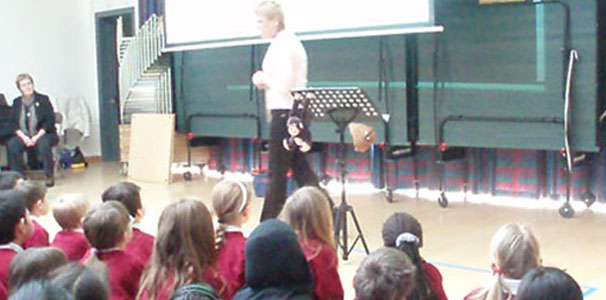School assemblies – thoughts and tips from Rachel Foster of Bridgebuilder trust Milton Keynes
A school assembly is one of the few times when the whole school community joins together as one. The short snippet of time during a busy day offers a different focus from other activities.
Assemblies bring opportunities for pupils to think not just about themselves, but beyond themselves. It’s a time where they have the space to think about values, morals and faith and a chance for them to reflect on the things that affect them, influence them and shape them.
As Christian visitors in a school, it is essential to conduct ourselves in an acceptable and appropriate manner. Building good relationships is fundamental to becoming part of the school family and having further opportunities to share the Christian faith and values.
It’s easy for us to think that our job is to preach and convert! The truth is schools are a place to educate not evangelise. We can use phrases like ‘The Bible says…’ or ‘Christians believe…’ We must remember that it is not our place to tell anyone what to think or believe. We may, however, encourage people to think about what they do believe.
It’s also important to remind ourselves that our actions speak louder than our words. The way we interact can have an incredibly positive influence. By making eye contact with pupils and smiling at them, we show that we care and value them. By being genuinely interested in staff and having time to listen to them, we can be like a breath of fresh air in a difficult environment. We should always ask God to shine out of us in all we do and say.
Our society brings many challenges for children and young people as they grow and develop, so being invited into schools to take an assembly is a privilege and a responsibility.
Below are a few tips to help as we prepare for the task:
- Be prepared Have a good starter to get the children and staff interested and thinking. Use a good story with something visual and interactive to make it memorable. Conclude with time to reflect and a thought to challenge.
- Have a clear aim Be sure of your theme or message and stick to it.
- Believe that what you are saying is valuable Being confident brings clarity.
- Be relaxed If you are relaxed and calm, your audience will be too!
- Smile and make eye contact The pupils will know that you value them and they will be engaged.
- Use the right language Don’t use big words or Christian jargon.
- Be sensitive to pupils from different faiths Don’t say or do anything that you would not like a visitor from another faith group to say or do if you were in the audience.
- Encourage pupils to think about what they believe Use phrases like ‘I wonder what you think…?’ or ‘Have you ever thought about that before…?’
- Use your voice Be loud, clear and deliberate. Talk in a loud whisper for effect.
- Use humour and timing Make it entertaining by using a little humour. Pause and allow time for what you are saying to sink in.
- Be positive If you need to bring a little order, praise good behaviour – others will follow.
- Be yourself Don’t try to copy anyone else’s style. Be true to who you are and enjoy it!
Rachel has written assembly outlines ideal for use in the run up to the Olympic games. Team Talk gives you five presentations for KS2 assemblies featuring Bible stories told by Jon Burns and the sporting experiences of five athletes talk about how Jesus makes a difference in their lives. To purchase a copy of Team Talk click here.

